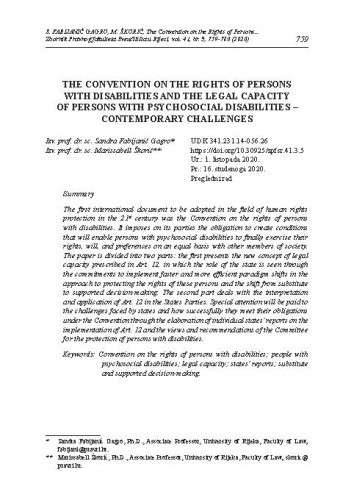The first international document to be adopted in the field of human rights protection in the 21st century was the Convention on the rights of persons with disabilities. It imposes on its parties the obligation to create conditions that will enable persons with psychosocial disabilities to finally exercise their rights, will, and preferences on an equal basis with other members of society. The paper is divided into two parts: the first presents the new concept of legal capacity prescribed in Art. 12, in which the role of the state is seen through the commitments to implement faster and more efficient paradigm shifts in the approach to protecting the rights of these persons and the shift from substitute to supported decision-making. The second part deals with the interpretation and application of Art. 12 in the States Parties. Special attention will be paid to the challenges faced by states and how successfully they meet their obligations under the Convention through the elaboration of individual states’ reports on the implementation of Art. 12 and the views and recommendations of the Committee for the protection of persons with disabilities.; Prvi međunarodni dokument koji je na polju zaštite ljudskih prava usvojen u 21. stoljeću bila je Konvencija o pravima osoba s invaliditetom. Ona svojim strankama nalaže obvezu stvaranja uvjeta koji će omogućiti da osobe s duševnim smetnjama konačno ostvare svoja prava, volju i sklonosti na ravnopravnoj osnovi s ostalim članovima društva. Rad je podijeljen u dva dijela: u prvom dijelu izlaže se novi koncept poslovne sposobnosti propisan u čl. 12. Konvencije u kojem se uloga države sagledava kroz preuzete obveze realizacije brže i učinkovitije promjene paradigme u pristupu zaštiti prava ovih osoba te pomaka od zamjenskog ka potpomognutom odlučivanju. Drugi dio rada bavi se tumačenjem i primjenom čl. 12 u državama strankama. S kojim se izazovima države pritom susreću i koliko uspješno udovoljavaju obvezama iz Konvencije, u radu se analizira kroz razradu izvješća pojedinih država o implementaciji čl. 12. te stavova i preporuka Odbora za zaštitu osoba s invaliditetom.; Das erste völkerrechtliche Instrument im Bereich des Menschenrechtsschutzes das im 21. Jahrhundert verabschiedet wurde ist die Behindertenrechtskonvention. Die Konvention verpflichtet ihre Parteien jene Umstände zu schaffen, welche Menschen mit geistiger Behinderung ihre Rechte, Willen und Neigungen geltend zu machen ermöglichen, und zwar auf gleicher Grundlage wie allen anderen Gesellschaftsmitgliedern. Dieser Beitrag ist in zwei Teile gegliedert: im ersten wird der neue Begriff der Geschäftsfähigkeit nach Maßgabe Art. 12 der Konvention aufgezeigt, in welchem die Rolle des Staates aus der Perspektive der übernommenen Pflichten der Realisierung einer schnellen und wirkungsvollen Änderung des Zugangs zum Schutz der Behindertenrechte, und des Voranschreitens von stellvertretender zur unterstützen Entscheidungsfindung. Der zweite Teil befasst sich mit der Auslegung und Anwendung des Art. 12 in Konventionsstaaten. Ausgehend von den Berichten einzelner Staaten zur Implementierung des Art. 12 und Ansichten und Empfehlungen des Ausschusses für den Schutz von Behinderten wird auf die Herausforderungen, mit welchen sich die Staaten auseinandersetzen müssen, hingewiesen und darüber hinaus erläutert, mit welchem Erfolg die Staaten die Konventionsforderungen erfüllen.; Il primo documento internazionale adottato nel campo della protezione dei diritti umani nel XXI secolo fu la Convenzione sui diritti delle persone con disabilità. Essa impone alle parti l’obbligo di creare le condizioni che finalmente permetteranno alle persone con disabilità psicosociali di esercitare i loro diritti, la loro volontà e le loro preferenze nel rispetto dell’uguaglianza di tutti i membri della società. Il lavoro è suddiviso in due parti: la prima presenta il nuovo concetto di capacità giuridica prescritta nell’ art. 12, nel quale il ruolo dello stato è percepito tramite qli impegni intrapresi nell’implementazione per un cambiamento di paradigma più veloce e più efficace nell’aproccio della protezione dei diritti di queste persone e per uno spostamento dal processo decisionale sostitutivo a quello supportato. La seconda parte tratta l’interpretazione e l’applicazione dell’art. 12 negli Stati membri. Un’attenzione speciale sarà data alle sfide affrontate dagli stati e con quanto successo essi rispettino gli obblighi imposti ai sensi della Convenzione tramite l’elaborazione dei rapporti dei singoli stati nell’implementazione dell’art. 12 e le prospettive e le raccomandazioni della Commissione per la protezione delle persone con disabilità.
Sažetak

